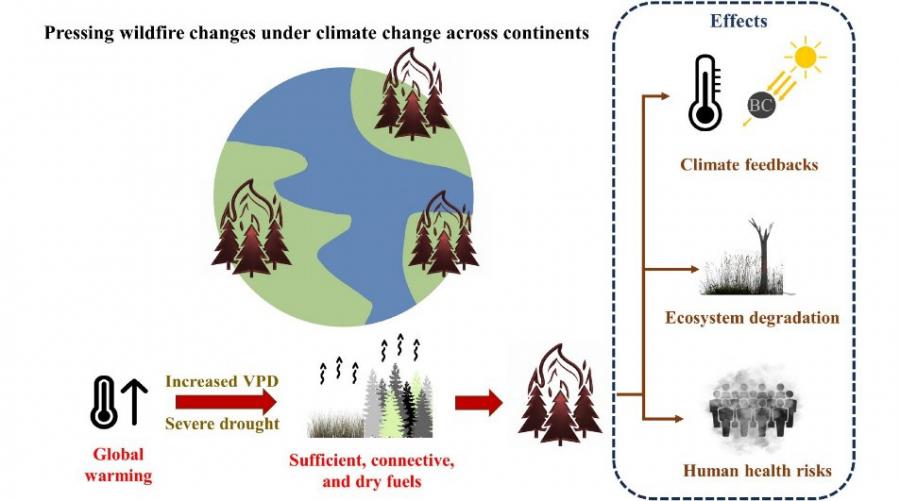
From embers to crisis: the expanding threat of wildfires under global warming
USA, August 21, 2024 /EINPresswire.com/ -- Wildfires are emerging as a critical global issue, intensified by climate change and increasingly threatening both the environment and public health. A recent study reveals that these fires are not only becoming more frequent but also more severe, particularly in high-latitude regions such as Asia and North America. The research underscores the serious dangers posed by unchecked wildfires, which release vast amounts of greenhouse gases and pollutants, endangering ecosystems and human health. The study calls for urgent action to better understand and manage these fires to safeguard the planet.
Globally, wildfires are on the rise, driven by climate change, which exacerbates droughts and high temperatures. These fires contribute significantly to carbon emissions and particulate matter (PM2.5), with severe consequences for both climate stability and public health. While some regions have experienced a decline in burned areas, high-latitude regions are facing more intense wildfire events. In response to these challenges, there is a pressing need for in-depth research to understand and mitigate the impacts of wildfires.
A study (DOI: 10.1007/s11783-024-1890-6) led by researchers from Fudan University, published on July 19, 2024, in Frontiers of Environmental Science & Engineering. examines global wildfire trends and impacts over the past two decades. The study analyzes data on burned areas, carbon dioxide (CO2) emissions, and PM2.5 across continents, highlighting the urgent need to address the escalating threats posed by wildfires, especially in high-latitude regions where climate change has significantly intensified fire activity.
The study reveals that wildfires globally burn approximately 3-4% of land each year, leading to massive emissions of greenhouse gases and pollutants. Although global burned areas have generally declined, particularly in Africa, high-latitude regions in Asia and North America have seen increased variability and severe wildfire events in recent years. The research points to climate change as a key driver of these trends, particularly in high-latitude regions. These fires are major sources of CO2 and PM2.5, contributing to climate warming and posing significant health risks, especially in poorly managed areas. The study highlights the need for targeted research and effective management strategies to mitigate the impacts of wildfires.
Dr. Hongliang Zhang, a leading researcher, stated, "Our findings underscore the urgent need for global collaboration to combat the rising threat of wildfires. The variability in wildfire activity across continents reflects the complex interactions between climate change, vegetation, and human factors. By focusing on high-risk areas and improving fire management practices, we can reduce the severe health and environmental impacts of these fires." Dr. Zhang’s comments emphasize the importance of targeted efforts to manage and mitigate wildfire risks.
The study's findings have significant implications for shaping future wildfire management strategies. By identifying the key drivers of wildfire activity and their health impacts, the research provides a solid foundation for developing more effective policies and practices. These insights are vital for policymakers, environmental agencies, and public health organizations in planning and implementing measures to reduce wildfire risks and enhance resilience in vulnerable regions. The study also highlights the ongoing need for research to adapt to the evolving challenges posed by climate-driven wildfires.
DOI
10.1007/s11783-024-1890-6
Original Source URL
https://doi.org/10.1007/s11783-024-1890-6
Funding information
This work was supported by the National Natural Science Foundation of China (Nos. 42077194, 42061134008, and 42377098), the Shanghai International Science and Technology Partnership Project (China) (No. 21230780200), and the Shanghai General Project (China) (No. 23ZR1406100).
Lucy Wang
BioDesign Research
email us here
Distribution channels: Environment, Science
Legal Disclaimer:
EIN Presswire provides this news content "as is" without warranty of any kind. We do not accept any responsibility or liability for the accuracy, content, images, videos, licenses, completeness, legality, or reliability of the information contained in this article. If you have any complaints or copyright issues related to this article, kindly contact the author above.
Submit your press release
